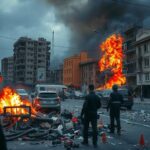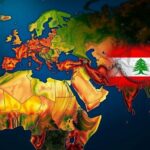Syria Rebels Initiate Major Offensive in the North-West, Seize Territory from Assad
Rebel forces in north-western Syria have launched a major offensive against President Bashar al-Assad’s regime, capturing territory for the first time in years. The Islamist group Hayat Tahrir al-Sham (HTS) has seized multiple locations in Aleppo and Idlib, resulting in significant casualties on both sides. The offensive raises serious humanitarian concerns amid ongoing civil strife in a region already beleaguered by conflict.
In a significant development in the Syrian civil conflict, rebel forces have initiated a substantial offensive in the north-western region of the country, successfully capturing territory from President Bashar al-Assad’s forces—a marked achievement not seen in years. The offensive, primarily led by the Islamist militant group Hayat Tahrir al-Sham (HTS) along with allied factions, has resulted in the seizure of numerous towns and villages across Aleppo and Idlib provinces since the onset of their attack on Wednesday.
The Syrian military has characterized the situation as a “large-scale” confrontation with “terrorists,” asserting that they are inflicting heavy losses on the rebelling factions. Reports from a UK-based monitoring organization indicate that the recent fighting has resulted in over 180 combatant fatalities from both sides, alongside the tragic loss of at least 19 civilian lives due to airstrikes executed by Syrian and Russian military forces in opposition-controlled areas.
The ongoing civil war, ignited in 2011 following severe governmental repression of peaceful pro-democracy demonstrations, has led to the death of more than half a million individuals. Idlib remains the last major opposition stronghold, currently inhabited by over four million displaced people facing dire living conditions. While predominantly controlled by HTS, the region also hosts Turkish-backed rebel factions from the Syrian National Army (SNA) and Turkish forces.
Despite a ceasefire established in 2020 by Turkey and Russia to manage the conflict in Idlib, intermittent violence, airstrikes, and shelling have persisted. Recent remarks by the UN’s special envoy for Syria, Geir Pedersen, suggested that conflicts in neighboring regions may be exacerbating tensions in north-west Syria. He noted significant military actions by HTS against government-held territories, alongside an uptick in Russian airstrikes.
In responding to the offensive, HTS claimed that their actions are aimed at countering aggression and asserted control over certain critical areas, including advancing within 10 kilometers of Aleppo city itself. As reported, their forces captured a base of the Syrian army’s 46th Regiment and a strategic intersection on the M5 highway, vital for communications between Aleppo and Damascus.
Despite the rebel advances, the Syrian military maintains that they are effectively responding to the ongoing attack, reporting substantial losses inflicted upon the insurgents. However, Iranian sources revealed the death of Brigadier General Kioumars Pourhashemi, an advisor to the military operations in Syria, reflecting the rising stakes in this complex conflict.
Moreover, the civilian toll is rising tragically, with the Syria Civil Defence reporting casualties from air raids targeting residential areas in Atareb and nearby towns. International organizations have expressed grave concern about the humanitarian impacts, with nearly 7,000 families being displaced amidst increasing hostilities. Calls for immediate de-escalation and civilian protection continue to escalate as the situation develops.
The civil war in Syria has been an ongoing conflict since 2011, initiated by the government’s violent crackdown on peaceful protests. Over the years, various factions have emerged, with the region of Idlib currently serving as the last significant opposition stronghold. The resurgence of violence stems from ongoing geopolitical tensions, with foreign involvement influencing the complex dynamics of the conflict. The area is particularly vulnerable due to a high population of internally displaced persons who suffer from deteriorating humanitarian conditions. Ceasefires brokered between foreign powers have temporarily halted large-scale assaults, but sporadic clashes and military actions have remained commonplace.
The recent offensive by rebel forces in north-western Syria marks a pivotal moment in the ongoing civil war, highlighting both the complex interplay of local and foreign influences and the dire humanitarian implications. With significant territorial gains achieved by the rebels and a notable civilian toll stemming from intensified airstrikes, the conflict continues to evolve amidst a landscape of shifting alliances and military strategies. As calls for de-escalation grow louder, the plight of millions displaced by violence remains a pressing concern that requires urgent attention from the international community.
Original Source: www.bbc.com








Post Comment